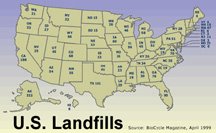Landfill odor to get airing
The Canton Repository
BOLIVAR - The Ohio Environmental Protection Agency is warning other landfills in the state about the same aluminum material that is buried at Countywide Recycling & Disposal Facility in Pike Township.
Its advisory, expected to be sent Monday, tells landfill operators to avoid exposing aluminum production waste to water because it can react and release toxic, flammable and potentially explosive gases.
“Unfortunately, it did take a situation here at Countywide to lead to the statewide level,” said EPA Environmental Manager Kurt Princic.
An estimated 300,000 tons of waste from an aluminum foundry was dumped at Countywide in the mid-1990s. Officials believe the waste reacted with liquid from other solid waste, generating the smelly gas that has made surrounding residents miserable.
On Friday, Princic told the county commissioners who run the Stark-Tuscarawas-Wayne Joint Solid Waste Management District that Countywide has removed 14 million gallons of water from the landfill this year. But the odor problem remains unacceptable, he said.
Robert Frey from the Ohio Department of Health said few studies have examined the chemical reaction of aluminum waste, which by itself is not considered hazardous.
“I couldn’t find anything comparable to what we are having here at Countywide,” Frey said.
The Ohio EPA will hold an informational meeting at 6:30 p.m. Nov. 16 at Faircrest Memorial Middle School at 616 Faircrest St. SW to discuss efforts to end the odor.
NEW RULES APPROVED
Separately, the board approved new rules that will govern how existing and new landfills operate and affect the surrounding community. The district has been using voluntary agreements with the landfills for the last several years.
“We are really plowing new ground here,” said Tuscarawas County Commissioner Kerry Metzger, chairman of the committee that drafted the rules. “But don’t go into this blindly, these rules will be challenged.”
The National Solid Waste Management Association said it could file a lawsuit against the district because the rules say area landfills can’t accept trash from waste districts in the state that don’t recycle as much as the regional district does.
The rules will take effect in 2008. Existing solid waste facilities will have six months to comply.
WAITING ON WATER STUDY
The board also delayed a decision on whether to give the U.S. Geological Survey more money to study the quality of water that flows into the Tuscarawas River.
The district hired the federal agency in October 2005 at $374,000 to collect data from past studies about the quality and availability of area water and where monitoring wells should be built. A report and database will be presented in January.
Another $1.5 million is needed to continue the five-year study, which will describe how industrial, agricultural and waste disposal affects the water quality in the Tuscarawas watershed, which includes Stark and 12 other counties.
Board members wanted to see if other agencies would partner on the project.














<< Home